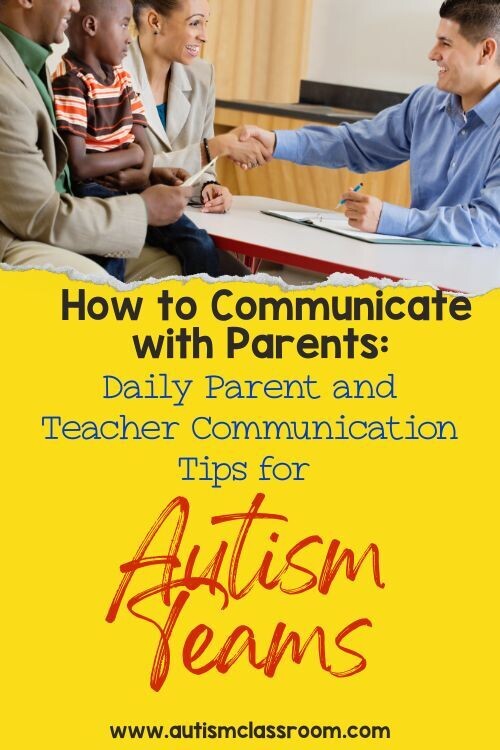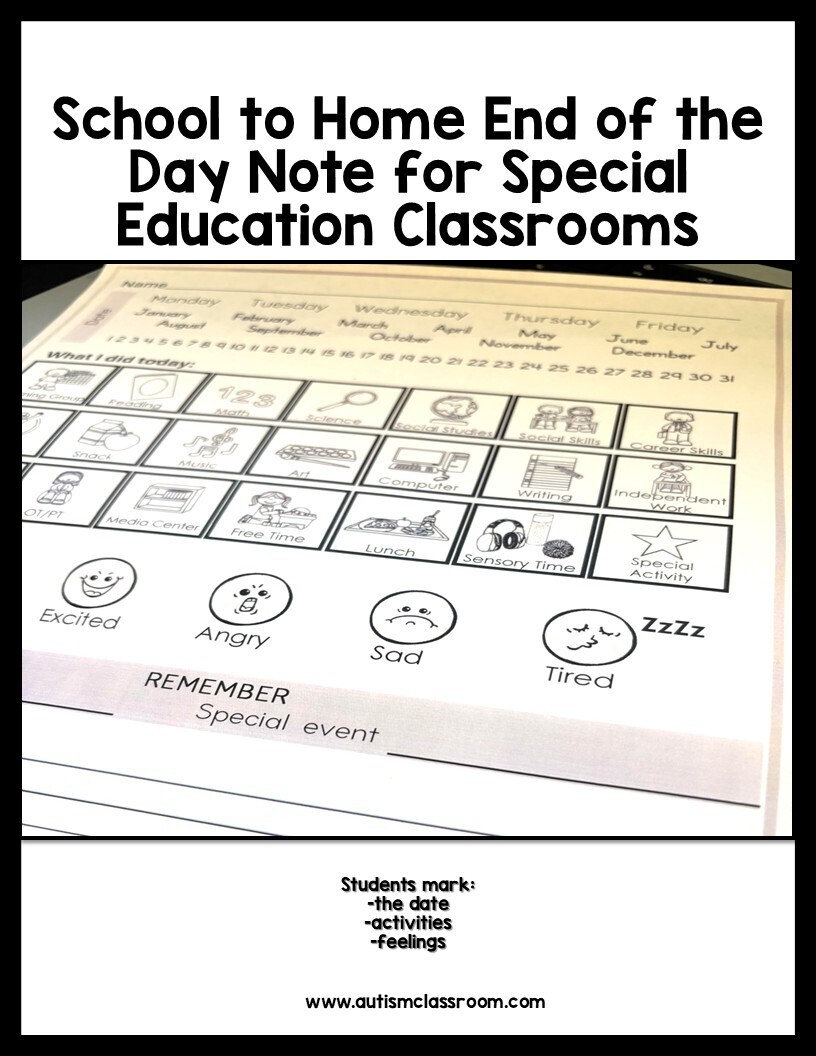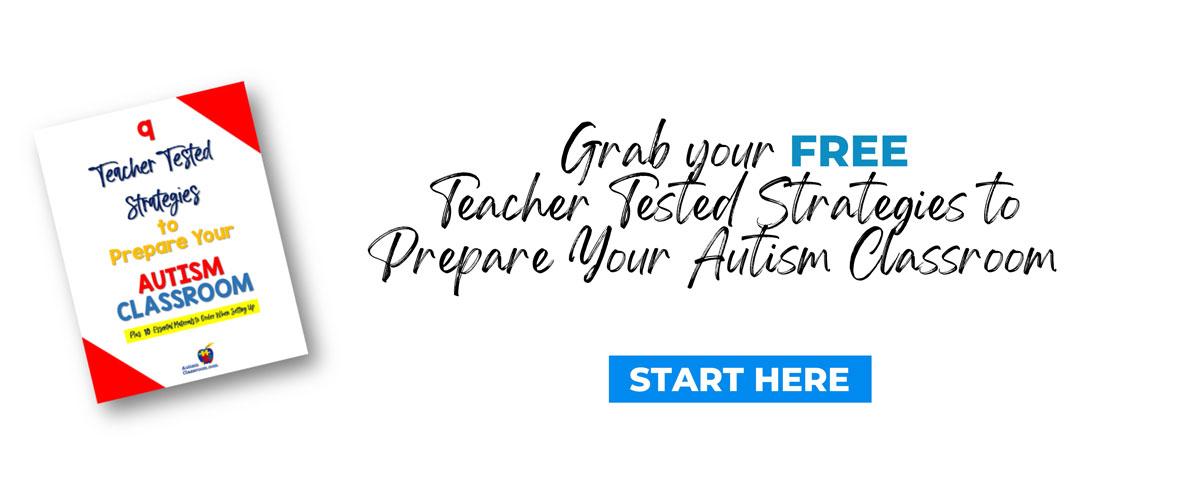
You’ve got six students, a pile of visual schedules, someone peeling the birthday decorations off of the birthday board, and now another staff member just popped their head in to say, “Have you called his mom yet?”
It’s barely 10 a.m. and you haven’t even recorded your attendance or remembered to take their lunch boxes out of their back packs.
Welcome to the real world of teaching students with intensive special needs.
Now take a deep breath. You’re not alone. There are a lot of us out here, you just may not have found them yet.
One area they don’t talk about nearly enough, which is a big part of the job (and just so you know some formal evaluations rate this) is communicating with families. For students with high support needs, parents or guardians are a gold mine of information and parent teacher communication is your lifeline. They know what works, what doesn’t, what’s new, and what’s changing with their child. But they also need to know you see their child, care for their child, and are doing your best.
When parent and teacher communication is strong, things run smoother. When it breaks down, well, everything gets harder. So, let’s walk through the tools and tips that will help you build solid, respectful, and effective communication routines.
Daily Communication Logs
This is the bread and butter of special ed communication. A one-page log with checkboxes, space for notes, and a clear layout goes a long way. You can include things like the student’s mood during the day, participation in activities, bathroom information, eating, speech device use, and more. Keep the notes short, clear, and specific.
For example, instead of saying “good day,” write something like “Kimmy used her voice output device to request snack.” Logs help parents feel connected and informed. Make a template for yourself or get one from us here.
Daily Notebooks
Sometimes a notebook is more useful than a form. A small spiral notebook that goes back and forth from home to school allows you to write a few lines each day and gives parents a place to respond. (To help the parent teacher communication, you can ask them to check or bend the page to show that they read it.) This system works especially well for students who can’t share about their day on their own. Be objective and be sure to share the good things a student does as well.
The key is consistency. Don’t start one and then stop writing by the third week. Even a few lines matter. If you’re short on time, teach a para-professional your systems for how to jot notes to parents. Or, create a checklist template that anyone on your team can use.
Consider using a formula. For example, here is a notebook success 3-step formula: wins-challenges-hope for a better tomorrow.

Apps and Messaging Tools
We live in a world of instant messages, and it can work to your advantage. Tools like ClassDojo, Remind, and Seesaw make it easy to send updates, reminders, or even photos. A quick picture of a student participating in circle time or finishing a task can brighten a parent’s day and build trust in the parent and teacher communication relationship. (Reminder: Only do this if your school allows it and never have other students in the shot.)
Some Considerations for Using Messaging Apps:
- Just remember, these tools are public-facing and your school system owns and monitors them.
- Triple-check your messages before sending.
- Don’t share personal info in group messages.
- Never, ever share information about another student with someone who is not their parent/guardian.
- Always use professional language.
- Always be objective and avoid sharing opinions, only share facts.
Phone Calls with a Purpose
Phone calls still matter. A call home to share a win or explain a situation adds a personal touch. But don’t just call when something goes wrong. Call when something goes right. If you need one, we have a phone log in our Autism Classroom Planner.
If you need to call about an issue, make sure you’ve gathered the facts first. Keep your tone calm and supportive.
- Do not overshare. Listen more than you talk.
- Don’t speak for everyone in your school. The phone is not a good place to hold a meeting.
- Do not make promises.
- If issues arise that are not related to everyday classroom activities, tell parents you can talk about it at the IEP meeting or a parent conference. You can say, “I will write down your concerns” or “We can schedule a meeting” so that you are acknowledging the concern but making a plan to address it.
Parents don’t want to feel ambushed or judged. They want to know you’re on the same team. Even when you have a difference of opinion, you can still let them know you hear them and you will get back to them. If you have a question, ask your admin or special education team for advice.
Email Updates
Some parents prefer email. If you want, you can send a weekly or bi-weekly recap of progress, fun moments, and classroom activities. Some people choose an occasional newsletter. Keep the tone warm and professional. Be careful with wording, especially when discussing challenges. With parent and teacher communication, you want to keep it factual and kind.
Daily email is too much. But email can be great for occasionally sharing schedules, upcoming events, or behavior data summaries. Just keep in mind that email doesn’t show tone well. Some tips:
- Reread everything before you hit send.
- Don’t use sarcasm. Don’t joke.
- Be friendly and professional.
- Standardize your greeting and closing for your emails.
Protecting Yourself: Parent Teacher Communication with Documentation
Now, here’s the part they really don’t teach you in school.
You have to cover yourself. Not because you’re doing anything wrong, but because communication can get tricky, especially if emotions get high. You are an extension of the school system you work for. Remember some communication challenges may have started before you even got the job and you'll want to already have a system in place to build that communication muscle before you need it. Here is how:
- Log every phone call. Keep a notebook or digital document where you record the date, time, who you spoke to, and what was discussed. (See our planner.)
- If a parent brings up an issue, write it down. Date it. Time it. Make note of what was said and how you responded. Keep a log for each student on a separate page.
- No side conversations off the record. Everything is on the record when you are a teacher.
- Be objective, not subjective. That means write what happened, not what you think happened. This is imperative. Using subjective wording, phrasing or sarcasm can cost you greatly.
Here’s a quick example:
Subjective: “He was having a bad attitude today.”
Objective: “He refused to complete two tasks and walked around for ten minutes during group.”
Words to be cautious with: bad, lazy, dramatic, hyper, rude, out of control. These describe your feelings and opinions, not the student’s behavior.
- If a parent calls and you feel upset, take a breath. Do not reply while angry. It’s okay to say, “Let me look into this and call you back.”
- If you don’t know the answer, say so. “I’m not sure, but I’ll find out and follow up.” It shows honesty and professionalism, and it gives you time to think.
Now when someone asks you, “Have you called his mom yet?” you’ll know what to do.
You’ll have the logs, the notes, the app messages, and maybe even the parent notebook. You’ll feel confident in what to say and how to say it. You’ll know how to celebrate wins and how to share challenges without making anyone feel blamed or overwhelmed.
So, pick up the pen. Open the app. Make the call. And if you’re ever unsure, just remember to keep it honest, keep it kind, and keep it about the student. Every time.


